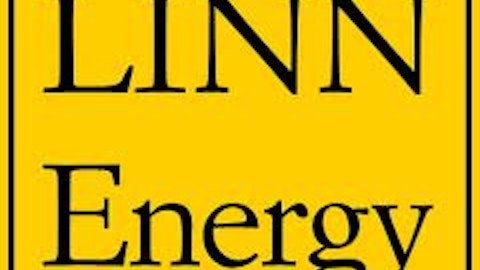Last week, Chesapeake Energy Corporation (NYSE:CHK) reported a first-quarter profit that beat Wall Street expectations, aided by strong oil production growth and higher natural gas prices during the quarter.
The Oklahoma City-based oil and natural gas producer reported net income of $58 million, or $0.02 a share, compared to a loss of $28 million, or $0.11 a share, in the year-earlier quarter.
Excluding the impact of hedging losses and other one-time items, Chesapeake Energy Corporation (NYSE:CHK) earned $0.30 a share on revenue of $3.42 billion, topping analyst expectations of a $0.25 per share profit on revenue of $2.85 billion.
With the company having embarked upon a new strategy of developing its existing asset base – as opposed to acquiring new assets – let’s take a look at three important takeaways from Chesapeake Energy Corporation (NYSE:CHK)’s first-quarter performance.
Progress in reducing expenses

It continues to make progress on this front, reporting a 18% decline in production costs from the year-ago quarter and a 26% year-over-year decrease in combined production and G&A costs, which fell to $1.11 per thousand cubic feet equivalent. Meanwhile, its upstream capital expenditures in the first quarter were at or below budget, suggesting that the company is serious about enforcing capital discipline.
Oil production growth
Another strong point from the company’s first-quarter performance was the continued increase in oil production. Due to severely depressed natural gas prices over the past few years, Chesapeake Energy Corporation (NYSE:CHK) embarked on a strategy to diversify its production mix away from the out-of-favor commodity and toward more profitable opportunities, such as oil and gas liquids.
First-quarter oil production rose 56% year over year, coming in at 103,000 barrels per day. The company’s Eagle Ford and Greater Anadarko Basin operations were crucial drivers of this production increase. Not surprisingly, Chesapeake Energy Corporation (NYSE:CHK) plans to allocate the vast majority of its drilling and completion capital this year to the Eagle Ford and the five core plays within the Greater Anadarko Basin.
Debt still a problem
Despite progress on these two fronts, the overarching issue of debt continues to cloud the company’s outlook. Long-term debt in the first quarter came in at a worrying $13.4 billion, roughly a billion dollars more than it was at the end of 2012. Part of the reason debt remained so onerously high is because of delays in receiving proceeds from previously closed sales.
This high level of long-term debt is one of the biggest reasons investors are concerned about the company’s future, especially considering that Chesapeake Energy Corporation (NYSE:CHK) pledged last year to bring its debt down to about $9.5 billion by the end of 2012 or early 2013 – a promise it has clearly failed to keep.
As a result of its high debt load, Chesapeake continues to face a daunting funding gap – the difference between its expenditures and its expected cash flow – of roughly $3.5 billion for the year, as per the company’s estimates. To help reduce this cash flow shortfall, it hopes to meet its asset sale target of $4 billion-$7 billion this year.
The article 3 Key Takeaways From Chesapeake’s First-Quarter-Earnings Report originally appeared on Fool.com and is written by Arjun Sreekumar.
Motley Fool contributor Arjun Sreekumar has no position in any stocks mentioned. The Motley Fool has the following options: Long Jan 2014 $20 Calls on Chesapeake Energy, Long Jan 2014 $30 Calls on Chesapeake Energy Corporation (NYSE:CHK), and Short Jan 2014 $15 Puts on Chesapeake Energy.
Copyright © 1995 – 2013 The Motley Fool, LLC. All rights reserved. The Motley Fool has a disclosure policy.



